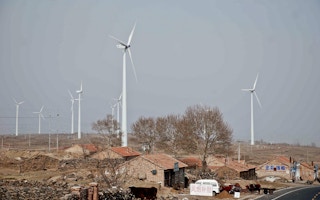The 2015 Paris climate change conference was a momentous political outcome as more than 190 nations have committed to take action on climate change by reducing greenhouse gas emissions and becoming more resilient to climate impacts.
Two other notable scenes on the environment and development front in 2015 were the International Conference on Financing for Development in Addis Ababa and the Sustainable Development Summit in New York. These meetings delivered above expectations and overlap with each other as financial resources, technology development and transfer and capacity building and the role of partnerships are acknowledged as critical.
If Paris was all about setting the goals and drawing the boundaries of the pitch, 2016 is a crucial year to translate these commitments into concrete actions and plans and ultimately take bolder steps towards achieving the long-term goal.
This is the central task of the Global Green Growth Week (#GGGWeek2016) taking place on September 5-9 on Jeju Island, Republic of Korea.
Organized by the Global Green Growth Institute (GGGI), a member-based international organization and its partners, the sessions throughout the five-day event are designed to maximize progress arising from important global meetings. #GGGWeek2016 will outline three ways to help countries make the transition to sustainable development.
First, we must mobilize finance to achieve growth in developing and emerging countries. Mobilizing the needed finance for a low-carbon transition is a question of turning Nationally Determined Contributions (NDCs) into long-term climate investment plans which are compatible with emissions reductions trajectories.
According to a report by Bloomberg New Energy Finance, $12.1 trillion investment is needed over the next 25 years to keep the world below the 2 degrees Celsius threshold. Mobilizing such large amounts of capital may seem daunting, but it is by no means impossible.
In principle, sufficient financial resources from the public and private sectors are available to support developing nations. However, not enough attention has been paid to enhancing the capacity of the system to absorb the capital in ways that are 1) beneficial to the poor in developing countries and 2) acceptable to those that bring the capital.
The Global Green Growth Summit (GGGS) aims to explore how we can unblock the barriers to capital flowing to developing and emerging markets.
Second, transitioning away from fossil fuels to renewable energy will bring health and financial benefits as well as enhance employment opportunities. Asia is claiming to be going green, but according to the International Energy Outlook 2016, China and India are projected to be the top two coal-consuming countries together with the United States, accounting for more than 70 per cent of world coal use.
For instance, in 2012, China accounted for 50 per cent of world coal consumption and its coal use is expected to grow through 2025. Coal is expected to continue to play a prominent role in Asia’s energy consumption due to the abundant regional endowment of coal and low extraction costs.
On a brighter note, energy demand is projected to almost double in the Asia and Pacific region by 2030. This rapid rise in demand is a reflection of the dramatic economic growth in countries such as China and India. Countries in Southeast Asia have also been enjoying remarkable economic progress in recent years while solidifying their position as a major driver of global growth in energy demand.
“
Growth in developing countries will continue, yet this growth needs to be green and inclusive.
Investments in renewables have now overtaken investments in fossil fuel and renewable investments in developing countries have significantly overtaken those in industrialized countries – all of which is positive. But the reality remains that making more money available and decreasing costs of technology is not enough to address the challenges of climate change.
The Asia Regional Policy Dialogue (ARPD) will examine the success factors and barriers to scaling up the transition from fossil fuel to renewable energy. The discussions will be tailored to the Asian context, in line with the goal of building consensus among major stakeholders on strategic, actionable solutions to be taken to promote clean energy.
Third, greater emphasis needs to be placed on creating better lives and livelihoods for poor people in society by using green growth policies. Billions of people have been lifted out of poverty, but the gap between the rich and poor is increasing. 90 per cent of urban population growth this century will occur in developing countries, predominantly in Africa and Asia and a significant proportion of that growth will be in cities that don’t exist yet.
Although the world has made significant progress in reducing poverty in the last decade, inequality still persists, with large portions of humanity, particularly in developing countries, lacking basic sanitation, access to electricity, and clean drinking water. Growth in developing countries will continue, yet this growth needs to be green and inclusive.
The discussion topics for the Green Growth Knowledge Platform (GGKP) Annual Conference include examining challenges of inclusive green growth, exploring the climate change and poverty nexus and identifying whether economic growth can be inclusive and green.
Global momentum is building towards a sustainable economy. A growing number of countries are determined to transition to an inclusive green economy as they recognize the fact that economic growth and sustainable development are complementary objectives.
In order to help countries make the transition to sustainable development, broad coalitions of actors need to work together for transformational systemic change, beyond individual projects, sectors or policies which by themselves will not generate the needed impact at scale.
Yvo de Boer is the Director-General of the Global Green Growth Institute (GGGI), a Seoul-based international organization. This piece was written exclusively for Eco-Business.









